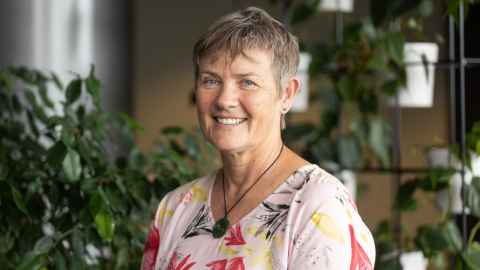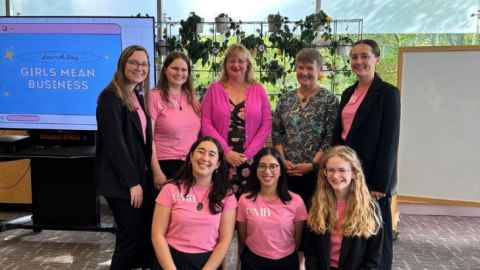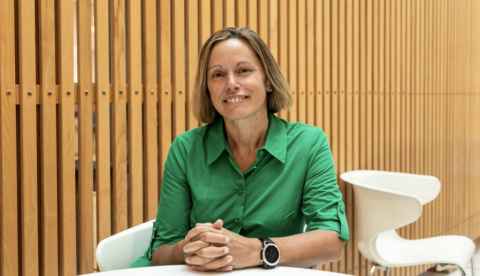Girls Mean Business initiative ignites passion for entrepreneurship
22 June 2025
A University-led leadership programme is empowering intermediate-aged girls to think big.

Professor Christine Woods, the Theresa Gattung Chair for Women in Entrepreneurship, has long been passionate about female entrepreneurship. Her interest was first sparked while working in Malawi as a small business advisor in the nineties.
“That’s where I ‘caught’ entrepreneurship,” she says. “I was really taken by the passion and energy of the women who were starting and running businesses there.”
Since those early days in Malawi she has completed a PhD on entrepreneurial decision-making, helped spearhead the University of Auckland’s Velocity Challenge and was part of the team that developed the innovation and entrepreneurship major at the Business School. She is now director of the Aotearoa Centre for Enterprising Women (ACEW), which was established and operates with Dame Theresa Gattung’s support. It conducts research on areas including the gender investment gap, allyship – the act of advocating for women facing gender-based discrimination – and gender capital, the insights women gain as a result of their gender.
Through her work at ACEW, Chris strives to create opportunities for girls in New Zealand that educate and empower. One such opportunity is the Girls Mean Business initiative, which she developed in 2016 when her daughter was intermediate-aged and returned to following the Covid-19 pandemic.
Girls Mean Business introduces Year 7 and 8 girls to entrepreneurship through one- and two-day programmes and an after-school option spanning several weeks. The initial offering was rolled out to ten schools and held in a single-day event at the Centre for Innovation and Entrepreneurship (CIE), with work now continuing onsite at schools in Auckland. Each programme consists of engaging interactive workshops covering topics such as accounting, finance, economics, marketing, management and information systems.
“Entrepreneurial mindset and financial literacy are the two key things that underpin what we do,” explains Chris.

Participants are encouraged to take risks and step outside their comfort zone, coming away with valuable skills they can take forward in their careers. This is exemplified with a challenge to devise a business concept. At ACEW’s partner school, Manurewa Intermediate, students have devised a variety of ideas including a jewellery brand, a stall selling home baking and support for people with mental health challenges.
“They have to be creative within that idea space, they have mto stand up and present their pitch, and they have to have the discipline to deliver their idea,” says Chris, adding that the feedback has been overwhelmingly positive. “They love the course.”
Girls Mean Business is now run by University students with Chris’s oversight. This not only enables the University students to develop their own business skills and take on a mentor role, but adds an aspirational element for the participants, who in some cases may be exposed to tertiary education for the first time.
It was Dame Theresa Gattung’s generous support in funding both the ACEW and Chair in Women in Entrepreneurship that enabled the establishment of Girls Mean Business. Her continued support, along with that of independent donors, is allowing the initiative to grow and reach its full potential.
A recent gift came from Māori alumna Melanie Smith CBE (Ngāpuhi), who graduated from the University with a Bachelor of Commerce and Bachelor of Laws (Honours) in 1997. She has since blazed an impressive path in the corporate world, with roles including CEO of Ocado Retail, the world’s largest online-only supermarket, and now, CEO of Birmingham’s NEC Group.
Mel is no newcomer to championing young entrepreneurs, having established the Mokaraka Wāhine Māori in Business Scholarship in 2019 to support other Māori women into business. She saw Girls Mean Business as a way of extending this support to an earlier age group who may then feel inspired and equipped to pursue business degrees.
“Through my conversations with Chris, I realised engaging Māori girls at a younger age would give them the tools and confidence they need to apply for university,” she says. “Ultimately, introducing girls to business in their early teens ensures there are more wāhine Māori for the Mokaraka Trust to support.”

Mel hopes that Girls Mean Business teaches participants some of the qualities that have been key to her own success, such as curiosity, competitiveness and confidence. Eventually, she would like to see Māori women leading major organisations in New Zealand and abroad.
“I’ve had some fantastic role models and mentors in my career, but I never had anyone who I felt represented me and my background,” she says. “I want this to change – I would like the next generation of wāhine Māori to know that having a successful career in business is achievable, and I would like to see more aspiring to be a CEO.”
The support of prominent female business leaders like Mel and Theresa – both role models themselves – is meaningful, says Chris.
“Mel and Theresa are paying it forward. These are women who want to make opportunities accessible. I’m really grateful.”
With their help, Chris hopes to expand Girls Mean Business to reach more intermediate girls across New Zealand. Currently the team is working on a new website with resources that will also be available in Te Reo to broaden access, with the long-term plan to roll out the full programme to a greater number of schools – in doing so, inspiring the next generation of business leaders and breaking down the barriers that exist for women today.
“There’s a proverb: ‘A person’s gift makes room for them’,” she says. “That’s what we endeavour to do here; to support our students to realise their potential. If we’re able to do that, eventually a Women in Entrepreneurship course will be redundant. Why would we need it? The support, the finance, the networks are there. That’s kind of the end goal.”
Media contact
Helen Borne | Communications and Marketing Manager
Alumni Relations and Development
Email: h.borne@auckland.ac.nz